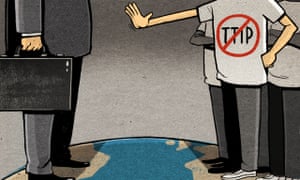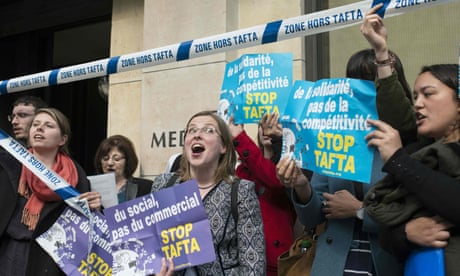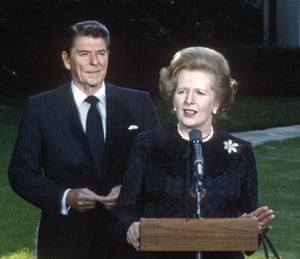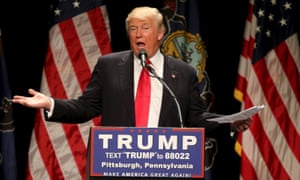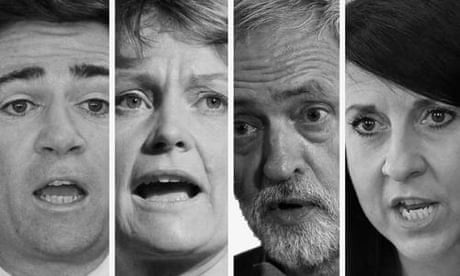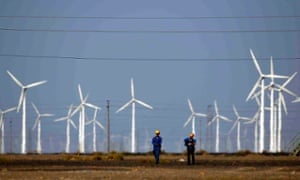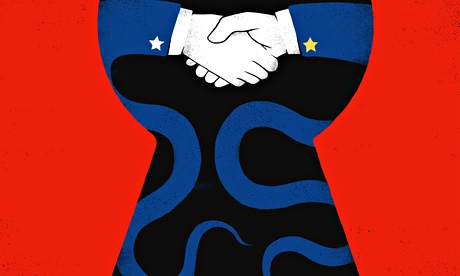Imagine designing one of our great cities from scratch. You would quickly discover that there is enough physical space for magnificent parks, playing fields, public swimming pools, urban nature reserves and allotments sufficient to meet the needs of everyone. Alternatively, you could designate the same space to a small proportion of its people – the richest citizens – who can afford large gardens, perhaps with their own swimming pools. The only way of securing space for both is to allow the suburbs to sprawl until the city becomes dysfunctional: impossible to supply with efficient services, lacking a sense of civic cohesion, and permanently snarled in traffic: Los Angeles for all.
Imagine designing a long-distance transport system for a nation that did not possess one. You’d find that there is plenty of room for everyone to travel swiftly and efficiently, in trains and luxury buses (an intercity bus can carry as many people as a mile of car traffic). But to supply the same mobility with private cars requires a prodigious use of land, concrete, metal and fuel. It can be done, but only at the cost of climate change, air pollution, the destruction of wonderful places and an assault on tranquillity, neighbourhood and community life.
This conflict is repeated in financial terms. In order that the very rich can pay less tax, public playgrounds are allowed to fall apart. The beneficiaries might use the extra money to build private play barns for their children. Public toilets are closed so that some people can install gold-plated taps in their bathrooms. Public swimming pools are put on restricted hours so that the very rich can turn up the thermostats in their private pools. Public galleries need to charge for entry so that billionaires can expand their own art collections. Wealth that could be shared and enjoyed by all is sequestered by a few.
Public luxury for all, or private luxury for some: this is the choice we face at all times – especially at this election
It is impossible to deliver a magnificent life for everyone by securing private space through private spending. Attempts to do so are highly inefficient, producing ridiculous levels of redundancy and replication. Look at roads, in which individual people, each encased in a tonne of metal, each taking up (at 70mph) 90 metres of lane, travel in parallel to the same destination. The expansion of public wealth creates more space for everyone; the expansion of private wealth reduces it, eventually damaging most people’s quality of life.

‘Look at roads, in which individual people, each encased in a tonne of metal, each taking up (at 70mph) 90 metres of lane, travel in parallel to the same destination.’ Photograph: Matt Cardy/Getty Images
This is a global issue, as well as a national one. According to the Global Footprint Network, every person in the UK uses the equivalent of 5 hectares of land and sea through the food we eat, the products we use and the carbon we release, which has to be absorbed somewhere if it is not to accelerate global warming. Yet the UK’s “biocapacity” (our ability to absorb these impacts) is a little over 1 hectare per person. Our extravagance is a cost that others must bear.
Public luxury available to all, or private luxury available to some: this is the choice we face at all times, but especially at this election. It is the conflict between these two visions that defines – or should define – our political options. There is a significant difference between Labour and the Conservatives in this respect, but I wish it were stronger.
Labour, through its proposed cultural capital fund, will reinvest in public galleries and museums. It will defend and expand our libraries, youth centres, football grounds, railways and local bus services. Unlike the Conservative manifesto, which is almost silent on the issue, Labour’s platform offers a reasonable list of protections to the living world.
But it also promises to “continue to upgrade our highways” (shortly after vowing to “encourage and enable people to get out of their cars”) and to provide new airport capacity. The conflicts are not acknowledged. Progress in the 21st century should be measured less by the new infrastructure you build than by the damaging infrastructure you retire.
Labour also misses a wonderful opportunity in its plans to expand affordable housing, to promote accommodation that both revives community and makes better use of space. In co-housing developments, people own or rent their own homes but share the rest of the land. Rather than chopping the available space into coffin-sized gardens in which a child cannot perform a cartwheel without hitting the fence, the children have room to run around together while the adults have space to garden and talk. Communal laundries release living space in people’s homes. Carpools reduce the need for parking. Isolation gives way to conviviality.
More importantly, and less surprisingly, the Labour manifesto fails to acknowledge the left’s great conundrum: the environmental damage caused by efforts to create jobs through economic growth. Like the Conservatives, like almost every party everywhere (the Greens are a notable exception), Labour’s economic vision is based on the presumption that there are no limits. Both conservative and social democratic parties see the world as a magic pudding that can never be exhausted. They build their economic programmes on a fairytale.
Labour, through its proposed cultural capital fund, will reinvest in public galleries and museums. It will defend and expand our libraries, youth centres, football grounds, railways and local bus services. Unlike the Conservative manifesto, which is almost silent on the issue, Labour’s platform offers a reasonable list of protections to the living world.
But it also promises to “continue to upgrade our highways” (shortly after vowing to “encourage and enable people to get out of their cars”) and to provide new airport capacity. The conflicts are not acknowledged. Progress in the 21st century should be measured less by the new infrastructure you build than by the damaging infrastructure you retire.
Labour also misses a wonderful opportunity in its plans to expand affordable housing, to promote accommodation that both revives community and makes better use of space. In co-housing developments, people own or rent their own homes but share the rest of the land. Rather than chopping the available space into coffin-sized gardens in which a child cannot perform a cartwheel without hitting the fence, the children have room to run around together while the adults have space to garden and talk. Communal laundries release living space in people’s homes. Carpools reduce the need for parking. Isolation gives way to conviviality.
More importantly, and less surprisingly, the Labour manifesto fails to acknowledge the left’s great conundrum: the environmental damage caused by efforts to create jobs through economic growth. Like the Conservatives, like almost every party everywhere (the Greens are a notable exception), Labour’s economic vision is based on the presumption that there are no limits. Both conservative and social democratic parties see the world as a magic pudding that can never be exhausted. They build their economic programmes on a fairytale.

Kelvingrove Art gallery in Glasgow. ‘Labour, through its proposed cultural capital fund, will reinvest in public galleries and museums.’ Photograph: VisitBritain/Britain on View/Getty Images
And they have another unexamined premise in common: that money legitimately buys you the power to take what you want from the world. There is an almost universal assumption in politics that you have the right to help yourself to as much of the global commons (atmosphere, soil, water, fish) as you can afford, though this reduces what is left for other people to share. You have the right to occupy as much physical space as your money can buy, regardless of the restrictions this imposes on others.
Where does this licence arise? Even if private wealth were obtained through the exercise of virtue (an unlikely proposition at the best of times) or through enterprise and hard work (ever less probable, in this new age of inheritance and rent), it is hard to discern the just principle that translates this money into permission to acquire the space and resources on which other people depend for a decent quality of life. When and by whom was this permission granted? How does it correspond to our notion of equal rights, or our concept of democracy, which is based on an equal power to decide?
You will not find these questions asked in this election or in any other. They are fudged by recourse to the magical belief that there is enough space and resources for everyone to do as they wish, that infinite growth ensures that no one – when the parties’ economic promises are fulfilled – will need to intrude on the interests of others. Yet, on this finite planet, they are the questions that will determine not only the quality of our lives but our security and, eventually, our survival. The primary task of all far-sighted politicians should be to decide first how much we can use, then how it can best be shared.
When the questions that count above all others are beyond the scope of politics, when almost everyone in public life is either too blinkered or too frightened to answer them, when – even in this great, defining election, which at last offers people meaningful political choice – neither large party can even name them, you begin to recognise how much trouble we are in.



